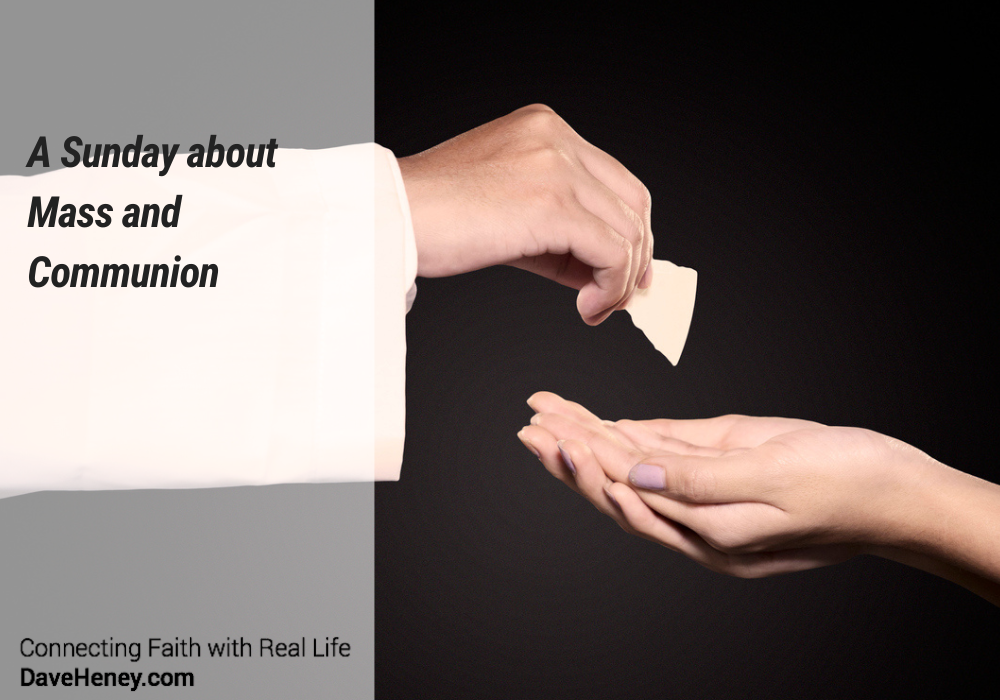
Gospel for June 19th 2022 – Luke 9:11b-17
Gospel Reflections for June 19th 2022
A Sunday about Mass and Communion
Everyone was satisfied after eating the food Jesus miraculously made!
Anyone who meets the Lord always comes away happier. Jesus founded the Church and sacraments to make His meeting with you happen …today!
What is the Mass and why does it change?
The Mass is a means to an end …to meet Jesus personally. The Mass changes only to make that meeting easier. Jesus empowers the Church to change it as needed …and remove any obstacles (Matt. 16:18). A big change came 500 years ago. Everyone knew Latin then, so Mass was in Latin everywhere.
Vatican II was a recent major change. Why was that?
The Church saw Catholics in WWI, WWII, and the rise of Communism. Over 150 million deaths! The Mass was having no effect on people! How to make the meeting with Jesus better? Change Latin to English, add more singing and responses, and reveal Jesus more clearly.
Who decides how Mass is celebrated?
The General Instruction of the Roman Missal (GIRM) guides everything. It also allows variations for local customs and traditions. We just follow the GIRM and Archdiocesan Guidelines here. Bishops can change the Mass in emergencies, like close churches, no cup, receive only in hand, etc. Pastors can also make small changes. Our procession will now begin from the front pews. No need to look behind you. Makes communion easier …which is the point!
Where do we meet and reverence Jesus in Church?
Before Mass …in the Tabernacle. During Mass …on the altar with the Priest who stands in His place. After Communion … inside you! (He wants to listen and speak personally to you!)
Most important time is your reflection with Jesus after your own communion.
There should be no distractions to your time with Our Lord. You welcome His presence in your life and ask Him to help change you for the better. Think about the rest of your day. How will you be different now …with Jesus inside you?
AFTER COMMUNION: GIRM only indicates your personal and private prayer.
No mention of waiting for tabernacle closing, or the celebrant sitting. Whether standing, sitting, or kneeling, your focus is now inside you with Jesus, not the tabernacle.
The name “Mass” comes from Latin “Missa Est.” (You are sent!)
The Mass is a means to an end, and that purpose is your changed life! Take the person of Jesus you met at Mass to all those you meet the rest of the day!
God Bless!
Fr. Dave

Dear Father Dave,
Your presentation of Mass protocol changes is so interesting. I remember the Latin Mass as well as the priest facing the alter rather than the congregation. Our prayer books also had English translations.
I’ve always thought that the most important part of the Mass was the Consecration and Communion, especially the partaking of Communion and its subsequent private moment of elevated prayer and closeness with Jesus.
Have a wonderful “ Father’s Day” weekend.
God bless!
Kathleen
I am glad you recognized that important moment of reception and then reflection. You understand the mass well!
The Eucharist clearly is the most important object on earth. Thanks for making that so clear to all!
You are very welcome!
Beautiful explanation of our precious Mass!! Loveeeeeeeeeeeeeeeeeeeeeeeeeeeeeeee our precious Cosecration and our precious Jesus in our Eucharist!!!! We are soooooooooooooooooooooooooooooooooooo Blessed!!!! Loveeeeeeeeeeeeeeeeeeeeeeeeeeeeeee our loving Catholic Faith filled with LOVE!!!! Thank you Father Dave for being a most beautiful priest!!! Our God, Jesus and our Mary loveeeeeeeeeeeeeeeeeeeeeeeeeeeee you so much and so do we!!!
Loveeeeeeeeeeeeeeeeeeeeeeeeeeeeeeeeeee, Franca and Dick
Thank you!
🙏🍇🍞 I love how you explain things in such a simple and direct way. Thank-You!
You are very welcome!
I truly believe in holy communion received by a true Catholics that are in good stead with the church. The churches dogma regarding proaboration and and receipt of the body and blood of Jesus Christ has me confused. Some parishes seem to play by different rules. Why?
The Church’s understanding of who can receive communion is pretty clear both in the Catechism and in Canon Law. Only mortal sin prevents reception and the Catechism explains that well. If a person consistently engages in very public and obvious serious sin, even after counseling by his or her Bishop, then that Bishop, and only that Bishop, can declare the person should not come to communion, as outlined in Canon 915 and 916.
So once one bishop declares to withhold do other bishops need to comply?
No, each Bishop has full authority within his own diocese.